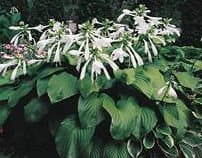
A recent heavy, overnight rain renewed plants and sent a message to dormant lawns — start sending up new green shoots. It’s also given me hope for a good showing from fragrant plantain lily (Hosta plantaginea, Zone 3) this month. It’s always a surprise to see these glossy, apple-green fragrant hostas sending up huge white trumpets in August, long after the other hostas have finished flowering. I first encountered the fragrant plantain lily outside an RCMP building where the plants had been growing for years. (No, I was not under arrest.)
Some smart plant hybridizer seized the opportunity and introduced sister plants for H. plantaginea with similar desirable traits. ‘Aphrodite’ (H. p. ‘Aphrodite’, Zone 3) has a large double flower and intense perfume that requires a hot summer to be at its best. (I think we can promise that this year.) ‘Venus’ (H. p. ‘Venus’, Zone 3) has double flowers extending in five-inch (13-cm) trumpets, opening in late afternoon and sending strong perfume into the night air. ‘White Fairy’ (H. p. ‘White Fairy’, Zone 3) is a recent cultivar bred in Japan, and not yet readily available. The Japanese name is ‘Yu Lei’, meaning white fairy. Its stamens have been converted to petals, resulting in triple flowers arranged in a hose-in-hose formation, with the same intense perfume.
These hostas are welcome in August, when other summer perennials are finishing and autumn perennials haven’t quite started. Their bright, shiny foliage makes an attractive filler in beds, with the added feature of fresh new leaves all summer. Almost all hostas put up their full seasonal foliage in spring, but Hosta plantaginea continues sending up fresh foliage throughout the season. Damaged or tired leaves can be removed, and new leaves allowed to fill the space for the remaining weeks of summer. In northern regions, H. plantaginea flowers best in a sunny location. What a useful plant, and we need more of it.
